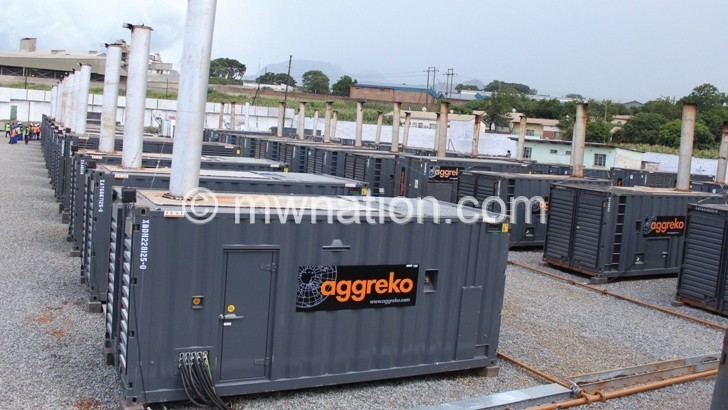SKC vindicated on Escom fraud
Financially-troubled Electricity Supply Corporation of Malawi (Escom) has confirmed losing 3.8 million litres of diesel worth K1.9 billion to a syndicate involving transporters, security guards and its staff.
Escom public relations manager Innocent Chitosi said in an interview yesterday the diesel, stolen between January and June this year, was meant for running power generators being managed by Aggreko International Projects—an independent power producer (IPP)—to help mitigate the power generation crisis in the country in the wake of challenges faced by Electricity Generation Company (Egenco).

Escom’s confirmation of the racket confirms revelations by Vice-President Saulos Klaus Chilima (SKC), who during the launch of United Transformation Movement (UTM) Southern Region rally at Njamba Freedom Park in Blantyre on Sunday, said that at least three million litres of fuel were recently stolen at the parastatal.
The Vice-President cited the diesel racket in his emphasis of entrenched corruption and fraud in government ministries, departments and agencies (MDAs) under the Democratic Progressive Party (DPP) administration.
In the interview, Chitosi said Escom has since written the supplier and operator of the generators, Aggreko, to explain the missing fuel.
He said: “In the month of June 2018, Escom noted that the
volume of fuel that was being bought did not match with the amount of power that was generated.
“We [Escom], therefore, deployed our team to investigate the issue and discovered that there was a syndicate involving some Aggreko technicians, fuel tanker drivers, security guards and our stores clerk.
“This led to the arrest of a tanker driver from Rashy Motors, three G4S security guards and our stores clerk in Lilongwe. The suspects are currently on bail.
“Meanwhile, we have written Aggreko to account for 3.8 million litres of fuel valued at K1.9 billion that could not be explained for between January and June 2018. The fuel was being bought at wholesale price.”
Chitosi said the fuel is supplied by the National Oil Company [Nocma] to Aggreko and the Escom stores team was supposed to be present during delivery.
To prevent further loss of fuel to theft, he said the parastatal has since July 2018 set up measures to seal all loopholes.
During the Sunday rally, Chilima—who stuck to his script of condemning the rot draining public resources in the DPP administration—also challenged responsible authorities to investigate officials from the Office of the President and Cabinet (OPC) and State Residences over their alleged roles in the award of a contract in the procurement of Escom generators to the fourth bidder instead of the successful bidder.
The Vice-President said a brave female Escom chief executive officer (Evelyn Mwapasa) was transferred to a ‘small” institution for allegedly refusing to take instructions from the officials.
In July, Escom said the diesel-powered generators have reduced load-shedding hours by nearly 75 percent in the last five months and the situation could stabilise further when an additional 20 megawatts (MW) imported from Zambia is added onto the grid by September.
A report by Escom senior manager for corporate planning said load-shedding spells reduced from 24 hours in November 2017 to the present six hours, owing to an additional 55MW made available in
January following the commissioning by President Peter Mutharika of diesel-powered generators run by Aggreko.
“The emergency diesel generators are running for an average of six hours a day, resulting in load-shedding reduction from an average of 24 hours in November 2017 down to the current six hours since February 2018,” reads the report titled Power Situation: Challenges and Plans.
The report further noted that industrial consumers now experience a load-shedding spell of 18 hours once a week while their domestic counterparts face six hours, down from 24 hours.
According to the 2018 Malawi Government Annual Economic Report, Escom posted a K6.3 billion loss in the period ending December 31 2017 which is attributed to the delays in effecting a tariff increase and costs associated with installation of the diesel generators.
However, findings in the 2016/17 National Audit Office report show that Escom and Agricultural Development and Marketing Corporation (Admarc) collectively abused K9.3 billion through procurement transactions they failed to account for.
In the case of Escom, the report said that during the financial year ended June 30 2017—whose audit was completed in November 2017—the power utility ordered goods valued at K8.3 billion from about 23 suppliers without following internal procurement procedures and without the knowledge of key management.
Further, the report said despite Escom embarking on a project to migrate customers from post-paid to prepaid billing through introduction of meters mounted on electricity poles to phase out the old three-phase system, the corporation continued to acquire the old three-phase meters.
“A total of 24 550 meters valued at K1.8 billion were received in March and April 2016, but only 330 items valued at K23 million were issued from stores in the last 12 months to June 2017,” reads the report.
In June this year, Escom board chairperson Thom Mpinganjira said his board had ordered a forensic investigation into what it called blatant disregard of procurement rules and regulations.
Mpinganjira, an accomplished businessperson and majority shareholder in FDH Financial Holdings Limited, was appointed to the Escom board earlier this year.
He said the irregular procurement decisions have left Escom with materials that it may not use for as long as 10 years while some would, over time, become technologically obsolete.
Recently, Escom sought a bailout of K58 billion from Treasury. However, Treasury refused to approve the same.





